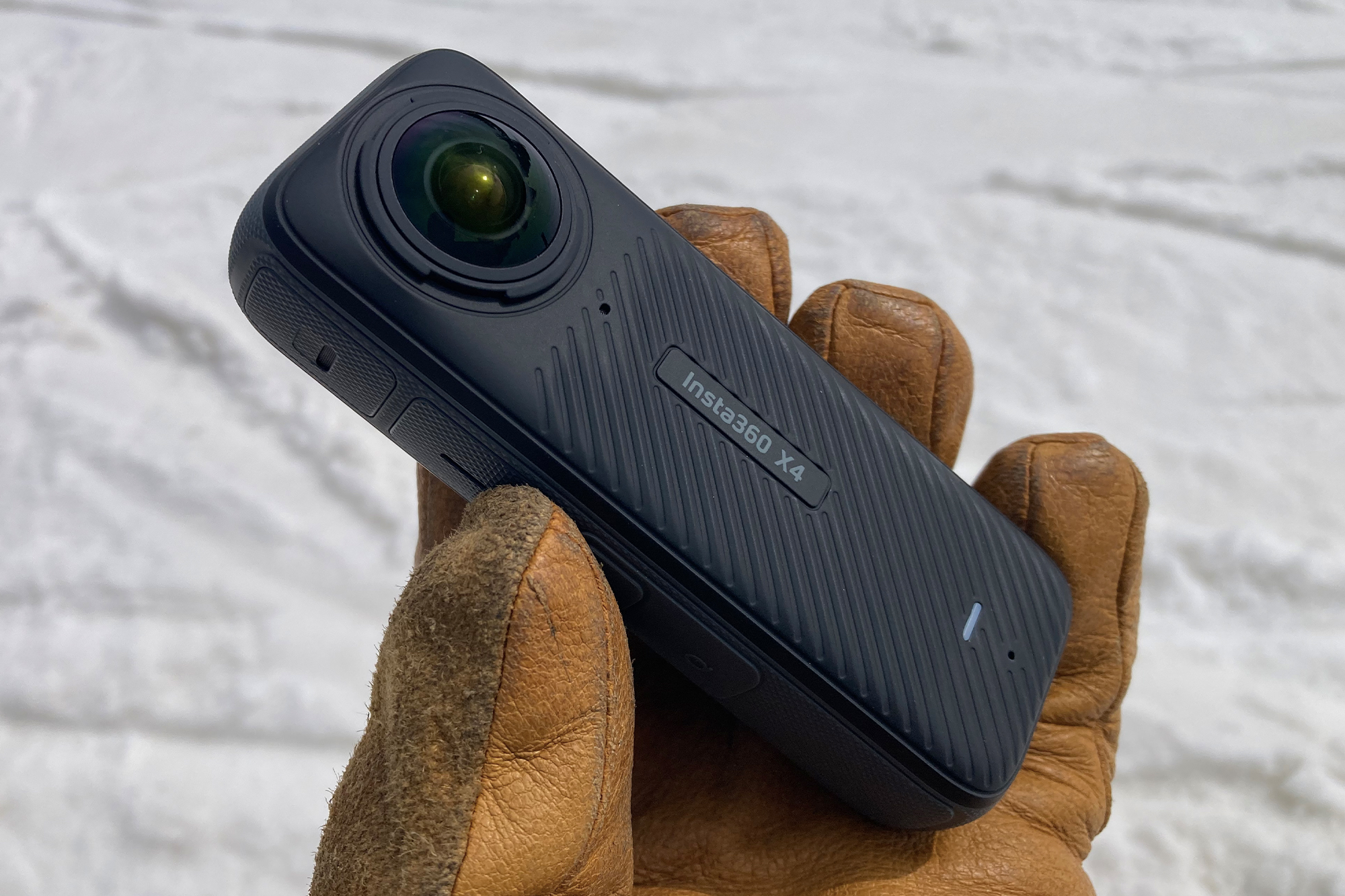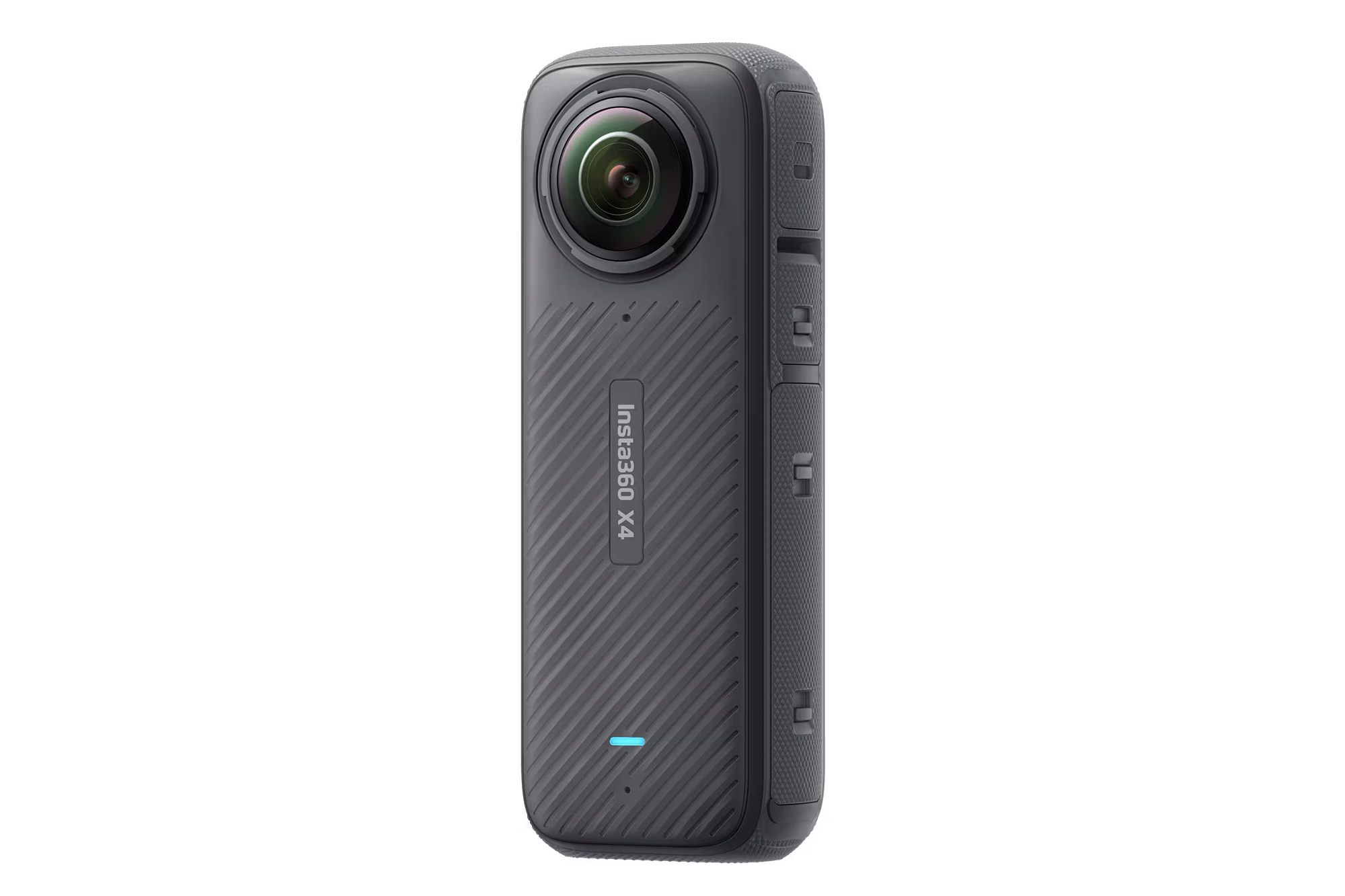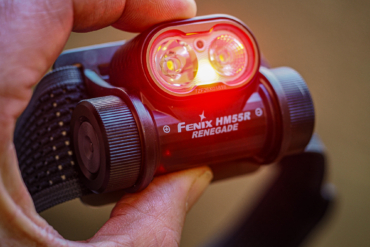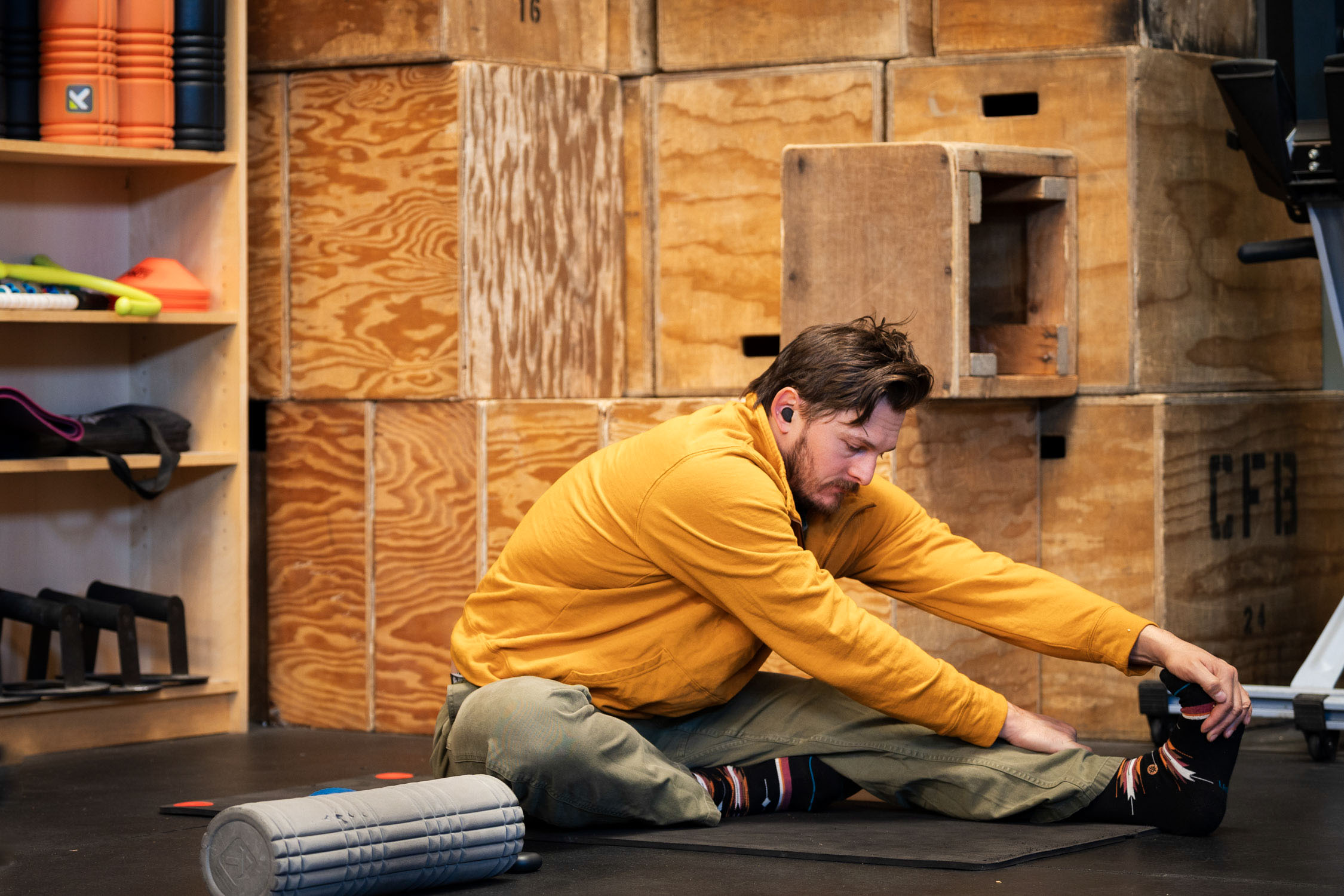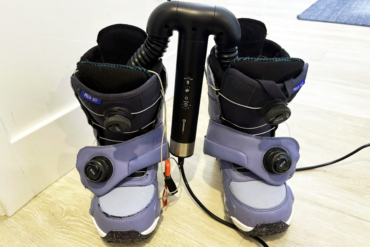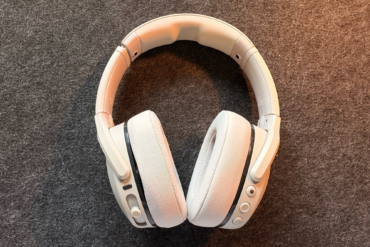I’m on the chairlift with my 6-year-old son at our local ski hill. He’s had a great ski season so far, but these years of skiing with him while he’s little are numbered. That’s why this has been a great opportunity to test the newest action video camera from Insta360, the X4, to document these precious moments. Also, it will be good to have evidence that I was once a better skier than him when he’s older.
But why stop at the slopes? We also took the Insta360 X4 camera on bike rides around the neighborhood and on a road trip to test out its panoramic capabilities.
It’s been a while since we’ve seen a new 360-degree camera. The GoPro Max was released in October 2019, and the Insta360 X3 was released in September 2022. Rumors of a new version, or at least an upgraded one, have been floating around for a while. But Insta360 has now released its X4 months ahead of schedule. A new GoPro is probably not far behind.
In short: The Insta360 X4 ($500) is the latest and most advanced 360-degree (aka spherical) consumer-grade camera. It brings upgrades across the board compared to the X3, like the new 5nm AI chip, 8K resolution at 30 frames per second, gesture control, a higher capacity battery, removable lens guards, and a bigger onboard screen. Other improvements are incremental resolution features that existed before like slow-motion and “Me Mode.” It also offers a simple editing app for your phone and computer-based editing software called Insta360 Studio.
- 8K 30fps 360-degree video:
- 5.7K 60fps and 4K 100fps 360-degree video:
- 4K 60fps single-lens mode:
- 120fps Me Mode:
- 5.7K 120fps bullet time:
- 11K timelapse:
- 8K timeshift:
- 73-megapixel in-camera pure shot photos:
- AI Gesture and voice control:
Pros
- Capture everything
- Very versatile
- Lots of mounting options
- Great editing software/companion app
Cons
- Non-replaceable lenses
- Low tolerance buttons
Insta360 X4 Review
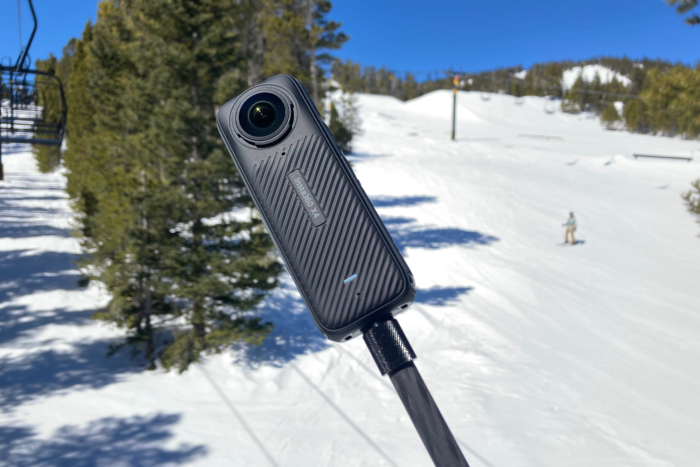
What’s New
The biggest improvement with the Insta360 X4 is the new 5nm AI processor chip. This chip is smaller and more efficient than the chip used in the X3. That’s significant because the chip in the X3 was the limiting factor in fully leveraging the potential of the dual 48-megapixel, half-inch sensors behind the lenses.
The new 5nm chip significantly increases the dynamic range and bitrate, supporting the higher resolution and frame rates available with the X4.
Here’s a list of the upgrades made possible with the 5nm chip:
- 8K 30fps 360-degree video
- 5.7K 60fps and 4K 100fps 360-degree video
- 4K 60fps Single-lens mode
- 120fps Me Mode
- 5.7K 120fps bullet time
- 11K timelapse
- 8K timeshift
- 73-megapixel in-camera pure-shot photos
Here are new features for the X4:
- AI Gesture control
- Dual Me Mode (looking forward or back)
And here’s what existed on the X3 but was updated again for the X4:
- Voice control
- FlowState stabilization
- Horizon lock
- Deep Track 3.0 subject tracking
The two new features for the X series (gesture control, and dual Me Mode) are not entirely new for Insta360. Gesture control has been available with other Insta360 products like Flow and Link. The X3 Me Mode only looked backward or toward the selfie stick. The X4 version can look backward or forward, with an improved frame rate of 120fps versus the X3’s 60fps. In our test on the ski hill, both of these features worked great.
The Form
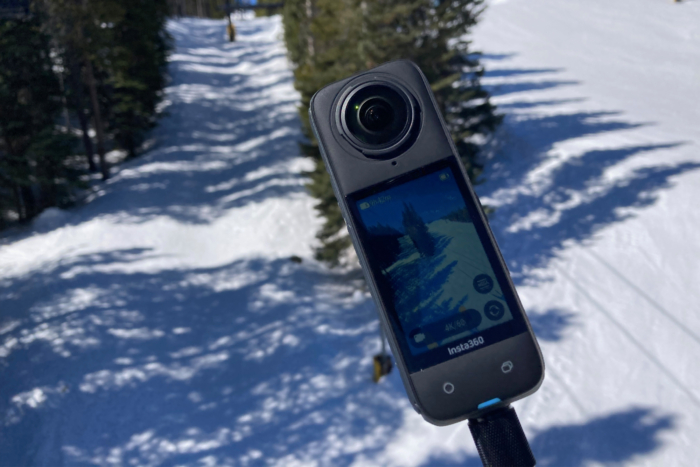
There has been little change on the exterior of the X4. Insta360 is holding strong with the stick-style shape. It still looks similar to the first version released in 2018, the Insta360 ONE X. This design keeps the lenses aligned on opposite sides of the camera.
Lens Care
Since the bulging fisheye lenses have to stick out from the body to get that wide-angle view, they are also the most vulnerable parts of the camera. While the lenses are still not removable or replaceable (even by Insta360), the X3 offers clear lens covers called lens guards. The X3 only had stick-on lens guards intended to be semi-permanently affixed, only to be replaced when scratched.
Those guards, even when brand new, can impact image quality. So the X4 offers lens guards that can be screwed on or removed as preferred. Insta360 includes a set of standard lens guards with the X4. A premium version can be purchased separately.
In my testing, I started using the lens guards, but I found they occasionally got knocked off when using the included lens cap.
So far, I’ve just gone without the lens guards and am very careful about protecting the lenses. I also found the included zippered pouch for the X4 to be an easy way to cover the whole camera, even when attached to a selfie stick.
Buttons
The X4’s physical buttons are the same four as the X3: Power, Q (a programmable function button), shutter, and menu (also programmable).
The nitty-gritty is controlled via the now larger 2.5-inch Corning Gorilla glass touchscreen, which is slightly larger than the X3’s 2.29-inch touchscreen. These buttons are easy to use with your bare hands, but I found the shutter (start/stop recording) button a little tricky to use with gloves on while in the ski area.
Since I couldn’t feel the “click” of the button through the gloves I discovered I was holding the button a little too long. It really just needs a very snappy push without any delay in releasing it. But this is where the hand gesture and voice control came in handy.
I appreciated having the power and Q buttons on the same side without any buttons on the opposite side. Again, with gloves while skiing I had to look to press the right button because they could not be felt through gloves.
Mounting and Tripod
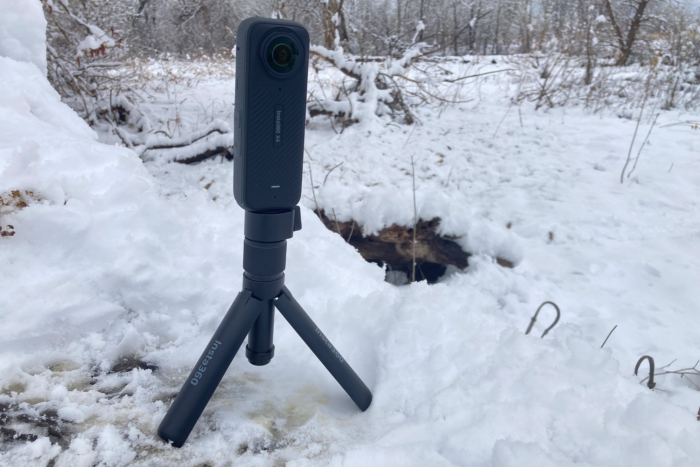
The X4’s base (like all previous models) includes a standard 1/4-20 receiver tripod mount. Instead of holding the camera in your hand, it is recommended that you use a selfie stick. Insta360 offers several options.
The camera is designed to eliminate the selfie stick from the shot when it’s stitched together. Hands holding the camera while shooting cannot be entirely eliminated in the stitching process. Insta360 calls this the “invisible selfie stick” feature, making it look like the camera is just floating in mid-air. The 9.8-foot Extended Edition Selfie Stick is great for drone-like shots.
More Battery
The battery compartment, USB-C port, and one of the microphones are on the opposite side of the power and Q buttons. The battery is very easy to remove and replace with a spare. But you won’t need to do that as often as with the X3. The battery capacity in the X4 has been increased to 2290 mAh — 67% more than the X3 batteries.
Between the new 5nm chip and larger battery capacity, the X4 will last longer than the X3 when shooting in the same mode. But when shooting in higher resolution modes, the camera will use more power.
The battery has a dual-latch design and is spring-loaded to pop up, so it’s easy to grab and swap. Unfortunately, the new dimensions of the X4 mean X3 batteries are incompatible.
Grip & Ruggedness
Both sides of the X4 have a rubberized diamond-grid grip finish and a new grooved diagonal ribbed pattern on the front. Those allow for excellent grip when handling the camera. The majority of the back side is the large touch screen. Like the X3, the X4 is waterproof to 10m (33 feet).
Video/Photo Transfer & Edit
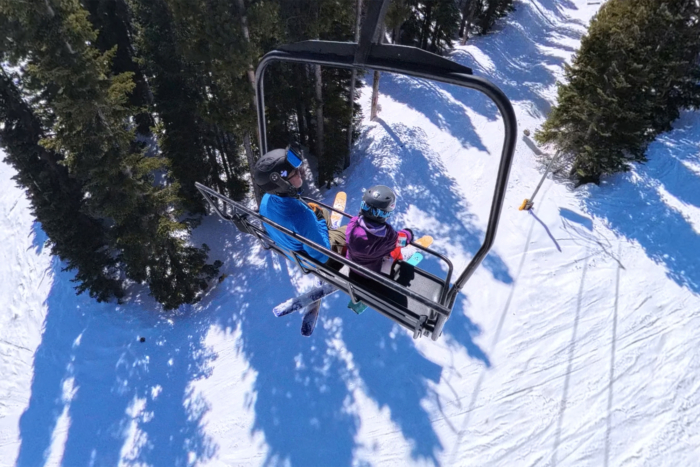
The file sizes can be quite big since the X4 shoots at 8K. This means it can take a good chunk of time — and eat a lot of battery — to transfer the footage to a phone via the wireless connection. Insta360 has a Quick Reader accessory that transfers files much faster than the wireless connection and saves the battery, mostly in the camera. Since the transfer is faster, it’s better for the phone battery as well.
As has always been the case with video, be smart about “editing in the shot” by only shooting what you want. Do not let the camera run and capture everything.
Editing Software
The editing software on the Insta360 app and the Insta360 Studio desktop program could be an entirely separate review. There’s a lot to unpack. But in short, Insta360 makes it pretty easy to stitch a few clips together and quickly share a video on social media.
Both the app and the desk/laptop version have many preset effects to apply to the videos. Insta360 also offers some shooting tips and tutorials on both platforms to help guide the novice video maker.
Editing With AI
Both platforms also offer an AI “Auto Edit” feature. For individual clips, the AI programming analyzes everything happening in the spherical video. It pulls key moments, zooms in and out, pans the frame, and tries to track the main subject.
Not surprisingly, it favored filming the person holding the camera because they are usually the most prominent subject. I found I had to use the tracking feature to have the camera focus on my son while skiing. So, it’s a good start, but it still needs some guidance when not using it as a selfie camera.
AI editor requires some thought, too. It isn’t quite as brainless as just filming long clips and throwing them into the AI editor. There are length limitations, and in my testing, that meant trimming each clip down to the parts I liked before turning it over to the AI editor. That was still rather time-consuming.
Overall, the AI edit did OK. It’s best for video montages with a music overlay, but it’s not so great for narrated videos. But I’ll reiterate: This is just the tip of the iceberg for what the editing software can do.
Accessories
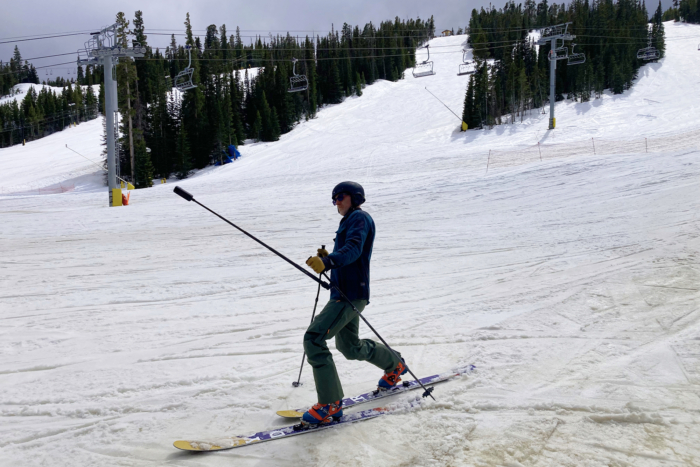
Aside from the Quick Reader mentioned above, Insta360 offers a great range of accessories to suit every type of action sports enthusiast. There’s a Ski Bundle ($590), Bike Bundle ($586), Motorcycle Bundle ($596), and Dive Bundle ($550), to name a few.
As a skier, the snow kit was my jam and the ski pole mount is one of the best I’ve seen. Instead of rigging the camera to the top or bottom of my ski pole, or forgoing a ski pole for a selfie stick, this mount holds the camera a few feet from the ski pole. It lets the user look natural as if they’re just holding the ski pole as expected.
Conclusion
The Insta360 4X is one of the market’s most advanced consumer spherical cameras. It can also be used as a standard action camera by setting it up with just a single lens. This is certainly one of the most versatile options on the market. But all of these great features come at a price and if you don’t need most of what the X4 offers, you can save a few bucks by going with the 3X.
Who knows? Maybe GoPro will price its forthcoming Max 2 a little lower than the X4 to make the decision a little harder.
